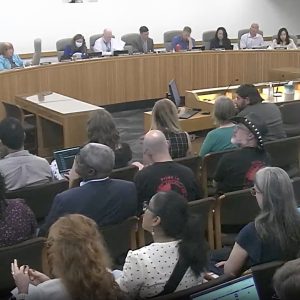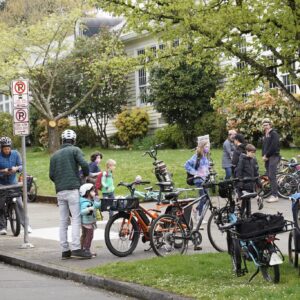A bill introduced in Salem this morning, HB 3622 (PDF), is being watched by biking and walking advocates for its possible impact on school transportation funding.
Authored by Rep. Betty Komp of Woodburn, the bill seeks to revise the method of calculating transportation block grants from the State School Fund distributions by allowing “district school [boards] to determine distances for which school [districts] will provide transportation. […] Allows Superintendent of Public Instruction to impose sanctions on school district for failure to maintain safe school buses and school activity vehicles.”
Because the bill deals with a block grant, any savings from bus service cuts are kept by the district and redistributed at the discretion of the Superintendent. This will likely mean that cuts to busing will in turn be reallocated to a number of district budgetary items, teachers’ salaries a possibility.
On the matter of the bill, Gerik Kransky of the Bicycle Transportation Alliance had this to say: “[we] would like to see more incentives from the state for school districts to encourage walking and biking as well as more money for Safe Routes to School.”
The Speaker’s office has referred the bill to various committees in the House. While the bill’s committee destination is unknown as of yet, by the end of the week, we’ll have a better idea of where the bill is headed. Possible destinations are the House Education Committee or even the House Ways and Means (Budget) Committee.
Download a PDF of the bill, here.
In other Salem news, two bike-related bills had public hearings/work sessions today. SB 130, which would add bicycle traffic signals into Oregon’s list of approved traffic control devices, gets its first shot in the House after passing the Senate 28-1 in February.







Thanks for reading.
BikePortland has served this community with independent community journalism since 2005. We rely on subscriptions from readers like you to survive. Your financial support is vital in keeping this valuable resource alive and well.
Please subscribe today to strengthen and expand our work.
This will be an interesting bill to watch take shape. Most school district “transportation departments” are really ‘yellow school bus departments’ with little focus on walking, biking, skating, carpooling or other transportation modes that families actually use to get to and from school.
There needs to be more funding and requirements for these departments to look at safe routes to schools and active transportation modes.
Does this bill address that or is it merely a way to move funding away from bussing into the classrooms?
Busses are an important tool in our safe school transportation system, we just need to expand that system to include other non-private automobile trips as well.
Here’s a good primer on the topic:
http://www.saferoutespartnership.org/local/112191#BusCuts
Great idea, really.
How do you propose we get past the parental impulse to insist that their children never leave a steel reinforced glass bubble lest they sue, sue, sue?
q’Tzal and Shane,
I’d like to weigh in. Which ever way things go with HB3266, I believe what needs to come from our state and local governments is at least verbal acknowledgment that SRTS programs should flourish. They represent cost savings and good downstream effects for the health of the district.
I would like to think that we could send more of the cost savings from busing to back into the classrooms so that our children actually have classrooms and teachers to go to. In West Linn-Wilsonville, spending cuts are likely to do away with many programs, which have had . We are afraid that our sustainability center, CREST, will fall under the cuts axe… when it was CREST that has sponsored the biking initiative for Boones Ferry Primary School and Wood Middle School. While funding for biking programs is vital to their continuance, I don’t believe we’ll need to put the entirety of the busing savings to SRTS programs. Also, there’s the matter that SRTS represents federal funding, and block grants from the state government would not feed into federally sponsored programs. We should also bear in mind that biking and walking programs would not require much in the way of start-up capital. In fact, that’s the beauty of them, they’re low-cost solutions to reduce overall district costs, and ideally, their self-sustaining. I return to my initial statement that verbal recognition, and lots of it, would be a very effective way for district superintendents to push the walking and biking programs… it would also be nice to have a little bit of money to push the agenda forward as well, I must admit.
Regarding the “sue, sue, sue”, district PTA’s could endorse SRTS , which in turn would cover the programs under the PTA’s umbrella insurance.
…. edit to my post, I meant HB 3622…
PPS could save a lot of transportation money by having reasonable school districts, especially in SW Portland. For example we live 0.5 miles from one elementary school, but belong to one that is 2 miles (and a steep hill and no sidewalks) away. This way our daughter can’t walk to school but has to take the school bus. If the school districts would follow logic, I’m sure a lot more kids could walk and the bus routes would be more efficient.
At the same time, it also seems to be very difficult to dissuade parents from taking their kids to school by car. It’s not so much “sue, sue, sue” but being afraid of the bogeyman. The chance of being abducted by a stranger is 1:1.5 million. Car accidents are number 1 death reason. 50% of accidents that happen to kids in front of schools are caused by other parents. And that doesn’t even take into account that the kids will die from obesity-related problems at age 40.
Will those sanctions come into play if the “Lord of the Flies” factor makes district transportation untenable? If so, good. If not, this bill doesn’t go far enough.